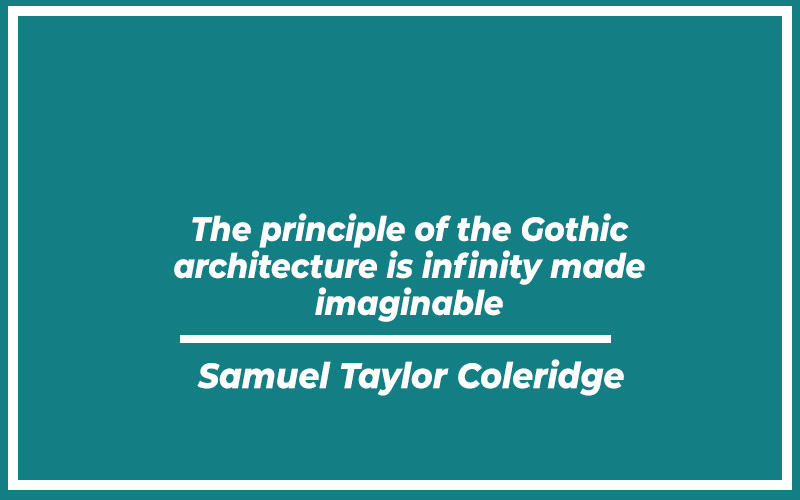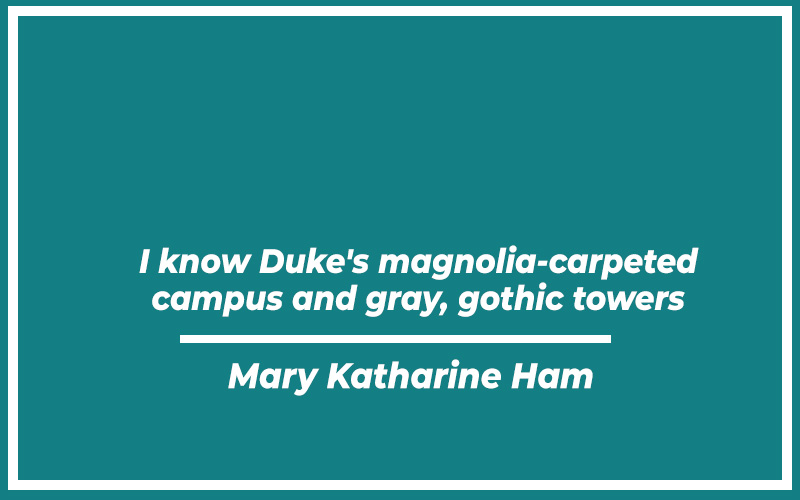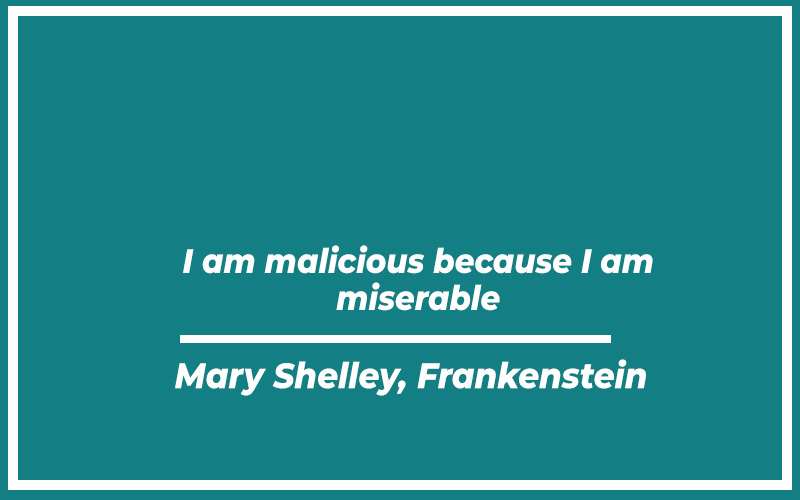Gothic quotes reflect the mysterious, dark, and romantic aspects of life. They often discuss themes like sadness, beauty, and the supernatural.
These quotes can be found in classic literature or modern stories, and they evoke deep feelings and curiosity.
If you are drawn to the darker side of life, you will find gothic quotes beautifully haunting, providing a glimpse into a world where shadows and light blend together.
Best Gothic Quotes

“The principle of the Gothic architecture is infinity made imaginable.” – Samuel Taylor Coleridge
Gothic architecture often evokes a sense of the infinite through its grand and intricate designs. Coleridge’s quote encapsulates this idea, highlighting how Gothic structures seem to stretch beyond human comprehension, embodying the vastness and mystery of the universe.
The soaring spires and intricate details of Gothic cathedrals aim to inspire awe and reflection, creating a tangible representation of the infinite. This connection to infinity is not just in physical space but also in the spiritual and emotional responses these structures evoke.
Also Read: Snoopy Quotes (with Explanation)
“The gothic reminds us that we are mainly driven by our passions; the Gothic deals in illicit desires, in what is prohibited by society.” – David Punter
David Punter’s observation on Gothic literature and architecture emphasizes the genre’s focus on human passions and societal taboos. The Gothic often explores themes of forbidden love, dark desires, and the supernatural, pushing the boundaries of what is socially acceptable.
This exploration of the forbidden allows readers and viewers to confront their own hidden fears and desires in a safe, fictional context, making the Gothic a powerful tool for examining the human psyche.
“Magic is a state of mind. It is often portrayed as very black and gothic, and that is because certain practitioners played that up for a sense of power and prestige. That is a disservice. Magic is very colorful. Of this, I am sure.” – Alan Moore
Alan Moore challenges the traditional association of magic with darkness and the Gothic. He argues that magic, often depicted as black and ominous, is actually vibrant and multifaceted.
This perspective invites a reevaluation of Gothic tropes, suggesting that what is often seen as dark and menacing can also be full of wonder and color. Moore’s quote encourages a broader understanding of the Gothic, one that includes both its dark and light aspects.
“The companions of our childhood always possess a certain power over our minds which hardly any later friend can obtain.” – Mary Shelley, Frankenstein
In “Frankenstein,” Mary Shelley reflects on the profound influence of childhood friendships. These early connections shape our identities and perceptions in ways that later relationships seldom match.
The Gothic elements in Shelley’s work often explore themes of loss and longing, making this quote particularly poignant. It underscores the idea that our formative years and the bonds we form then have a lasting, sometimes haunting, impact on our lives.
“Even broken in spirit as he is, no one can feel more deeply than he does the beauties of nature.” – Mary Shelley, Frankenstein
This quote from “Frankenstein” highlights the complex relationship between suffering and appreciation of beauty. Despite immense hardship, the character finds profound solace in nature’s beauty. This duality is a common theme in Gothic literature, where moments of despair are often juxtaposed with sublime beauty, emphasizing the emotional depth and complexity of human experience.
“Often in gothic novels there’s a large house, an estate, and it’s symbolic of that culture.” – Joyce Carol Oates
Joyce Carol Oates notes the recurring motif of grand, often decaying estates in Gothic novels. These structures symbolize the cultures they arise from, representing both grandeur and decline.
The large, often haunted houses serve as a microcosm of societal and familial decay, reflecting broader themes of isolation, madness, and the supernatural that are central to the Gothic genre.
“I loved fairy tales when I was a kid. Grimm. The grimmer the better. I loved gruesome gothic tales and, in that respect, I liked Bible stories, because to me they were very gothic.” – Amy Tan
Amy Tan’s appreciation for the darker aspects of fairy tales and Bible stories reveals the Gothic’s pervasive influence across various narrative forms.
The grim elements of these tales, with their themes of danger, morality, and the supernatural, align closely with Gothic sensibilities. Tan’s quote underscores the idea that the Gothic is not confined to a single genre but permeates many stories that deal with the darker sides of human nature and the world.
“A Gothic cathedral affirms that it was done by us and not done by us.” – Ralph Waldo Emerson
Emerson’s quote reflects on the paradox of Gothic cathedrals, which embody both human effort and divine inspiration. These majestic structures, with their intricate designs and towering spires, seem almost otherworldly, suggesting they are beyond mere human capability.
This duality underscores the Gothic’s ability to inspire awe and contemplation, bridging the gap between the earthly and the divine. The cathedrals stand as monuments to human aspiration and spiritual longing, capturing the essence of the Gothic in their enduring grandeur.
“But now I know that it is very important that all buildings should be consistent, that this is the quality of the Gothic cathedral, for instance, that we like.” – Minoru Yamasaki
Yamasaki emphasizes the importance of consistency in architecture, using Gothic cathedrals as a prime example. The harmonious blend of structural elements in these cathedrals creates a cohesive and powerful aesthetic.
This unity is a key characteristic of Gothic architecture, where every detail, from stained glass windows to vaulted ceilings, contributes to a unified whole. This consistency not only enhances the visual impact but also evokes a sense of order and spirituality, reflecting the Gothic’s profound connection to the divine.
“I have often thought upon death, and I find it the least of all evils.” – Sir Francis Bacon
Bacon’s reflection on death aligns with Gothic themes of mortality and the macabre. In Gothic literature and art, death is a pervasive presence, often depicted in a haunting yet fascinating light. Bacon’s view that death is “the least of all evils” suggests a philosophical acceptance, resonating with the Gothic’s exploration of existential themes.
This perspective encourages a contemplation of life’s transient nature and the inevitability of death, central motifs in the Gothic tradition that challenge readers to confront their deepest fears.
“Emotions don’t interfere in my acting, nor in my life.” – Simona Panova
Panova’s quote touches on the Gothic’s exploration of emotional detachment and inner turmoil. Gothic characters often grapple with intense emotions, yet there is also a recurring theme of repression and isolation.
By stating that emotions do not interfere in her acting or life, Panova highlights a stark contrast to the Gothic’s portrayal of characters overwhelmed by their feelings. This detachment can be seen as a defense mechanism against the chaos and horror that frequently permeate Gothic narratives, reflecting a deeper psychological complexity.
“The darkness that surrounds us cannot hurt us. It is the darkness in your own heart you should fear.” – Silvetris
Silvetris’ quote delves into the Gothic theme of internal versus external darkness. While the Gothic genre often features eerie settings and supernatural elements, its true power lies in the exploration of the human psyche. The real terror, according to Silvetris, is not the external darkness but the darkness within ourselves.
This idea is central to Gothic literature, where characters frequently confront their inner demons, revealing that the most frightening aspects of existence often stem from within.
“Maybe this world is another planet’s Hell.” – Aldous Huxley
Huxley’s quote offers a cosmic perspective on suffering, a theme frequently explored in Gothic literature. The notion that our world could be another planet’s Hell introduces a chilling existential contemplation.
This aligns with the Gothic tradition of questioning reality and exploring the boundaries between the known and the unknown. Huxley’s idea suggests that the horrors and sufferings of our world might be part of a larger, incomprehensible design, a concept that resonates deeply with the Gothic fascination with the macabre and the mysterious.
“Not all those who wander are lost.” – J.R.R. Tolkien
Tolkien’s quote, though not traditionally Gothic, can be interpreted within the genre’s context of exploration and discovery. Gothic literature often features characters on journeys through dark, unknown landscapes, both physical and psychological.
This quote suggests that such wandering, while seemingly aimless, can lead to profound insights and revelations. In the Gothic tradition, the act of wandering can symbolize a quest for truth or self-discovery, emphasizing that the journey itself, with all its trials and terrors, is a crucial part of the human experience.

“I know Duke’s magnolia-carpeted campus and gray, gothic towers.” – Mary Katharine Ham
Ham’s quote vividly captures the aesthetic of Gothic architecture within a modern setting. The juxtaposition of nature’s beauty with the imposing Gothic towers creates a striking image. This blending of the organic with the architectural highlights the Gothic tradition’s ability to evoke both awe and introspection.
The gray towers symbolize the timeless, melancholic beauty of the Gothic, while the magnolias add a touch of life and color, illustrating the complex interplay between life and the seemingly eternal structures.
“Before that I wanted to be a magazine illustrator – I probably would have painted Gothic scenes.” – Ira Levin
Levin’s reflection on his artistic aspirations underscores the enduring allure of Gothic imagery. Gothic scenes, with their dramatic contrasts and haunting beauty, offer rich material for visual storytelling.
Levin’s hypothetical choice to illustrate Gothic themes suggests an appreciation for the genre’s depth and its ability to evoke strong emotional responses. This speaks to the Gothic’s power to inspire not just writers and architects, but artists across all mediums, who are drawn to its evocative and multifaceted nature.
“Edinburgh is a sort of gothic fairytale city, and it can be a gothic horror city as well.” – David MacKenzie
MacKenzie’s description of Edinburgh captures the dual nature of Gothic aesthetics, which can evoke both enchantment and terror. This duality is a hallmark of the Gothic genre, where beauty often masks underlying darkness.
Edinburgh, with its historic architecture and misty landscapes, epitomizes this blend of fairytale charm and eerie atmosphere. MacKenzie’s quote highlights how the city’s Gothic elements contribute to its unique character, making it a perfect setting for stories that explore the thin line between wonder and horror.
“But to die as lovers may – to die together, so that they may live together.” – Joseph Sheridan Le Fanu
Le Fanu’s quote encapsulates the Gothic fascination with love and death. The idea of dying together as lovers speaks to the genre’s preoccupation with the tragic and the romantic. In Gothic literature, love often transcends the boundaries of life and death, creating a poignant blend of beauty and sorrow.
This quote reflects the intense emotions that drive Gothic narratives, where love is both a source of ultimate joy and profound tragedy, intertwining the themes of passion, mortality, and eternal connection.
“If ever you should need my life, come and take it.” – The Sea Gull
This quote from “The Sea Gull” conveys the Gothic theme of self-sacrifice and devotion. Offering one’s life for another evokes the intense emotional landscapes typical of Gothic tales, where characters often face extreme situations that test their limits.
This readiness to sacrifice underscores the genre’s exploration of deep, often dark emotions and the lengths to which individuals will go for love, loyalty, or redemption. It highlights the Gothic tradition’s ability to delve into the complexities of the human condition.
“Life is anything that dies when you stomp on it.” – Dave Berry
Berry’s stark observation fits well within the Gothic genre’s exploration of mortality and the fragility of life. This quote’s bluntness reflects the Gothic tendency to confront uncomfortable truths head-on.
The imagery of life being extinguished so easily underscores the genre’s preoccupation with death and the transient nature of existence. Gothic literature often dwells on the impermanence of life, using such stark imagery to evoke a sense of existential dread and to challenge readers to reflect on their own mortality.
“Hell is the possibility of sanity.” – Daria
Daria’s quote presents a paradox that aligns with the Gothic tradition’s exploration of madness and reality. In Gothic narratives, characters frequently grapple with their sanity, often finding that what appears rational can be terrifying. The notion that sanity itself could be a form of hell suggests a deep psychological torment, a common theme in Gothic fiction.
This quote challenges the conventional understanding of sanity, proposing that clarity and rationality might expose one to the harsh, unsettling truths of existence, a core element of Gothic horror.
“A shivery, delicious Southern Gothic with feuding families, dark spirits, ancient curses.” – Hillary Jordan
Jordan’s description perfectly captures the essence of Southern Gothic literature, a subgenre of Gothic fiction that explores the decay and grotesque within the American South. Feuding families, dark spirits, and ancient curses are hallmark elements that create an atmosphere of dread and mystery.
This quote highlights the rich, eerie setting typical of Southern Gothic tales, where the past continually haunts the present. The genre often delves into complex social issues, using supernatural and macabre elements to reflect on human nature and history.
“Better to rule in hell than serve in heaven.” – John Milton
This famous line from Milton’s “Paradise Lost” embodies the Gothic fascination with rebellion and defiance. The character of Satan, who utters these words, epitomizes the Gothic anti-hero, challenging divine authority and embracing damnation over subservience.
This quote reflects the Gothic themes of pride, ambition, and the tragic consequences of hubris. It also underscores the genre’s exploration of moral ambiguity and the allure of power, even when it leads to destruction. Milton’s work remains a cornerstone of Gothic literature, influencing countless subsequent tales of rebellion and loss.
“Desires are what can most easily ruin us, lovely.” – Simona Panova
Panova’s quote highlights the Gothic preoccupation with desire and its destructive potential. In Gothic literature, characters often fall prey to their deepest desires, leading to their downfall. This exploration of forbidden and overpowering passions is a key theme, emphasizing the tension between societal norms and individual impulses.
The quote serves as a cautionary reminder of the perilous nature of unchecked desires, which can lead to ruin and tragedy, a recurring motif in Gothic tales that delve into the dark corners of the human psyche.
“Death destroys a man, the idea of Death saves him.” – E. M. Forster
Forster’s quote encapsulates a profound Gothic paradox: while death is a destructive force, the contemplation of it can offer profound insights and even salvation. Gothic literature often explores the themes of mortality and existential dread, presenting death as both a feared end and a doorway to deeper understanding.
This duality reflects the genre’s fascination with the macabre and the philosophical, using death not just as a plot device but as a means to explore the human condition and the quest for meaning.
“History was written by those who hanged the heroes.” – Braveheart
This quote from “Braveheart” resonates with the Gothic theme of historical revisionism and the dark side of human history. Gothic literature frequently delves into the past, uncovering hidden truths and repressed memories.
The idea that victors write history while heroes are often vilified aligns with the genre’s focus on uncovering the sinister and forgotten aspects of history. This perspective challenges readers to question official narratives and consider the complexities and injustices that shape human experience, a core element of Gothic storytelling.
“To himself everyone is immortal; he may know that he is going to die, but he can never know that he is dead.” – Samuel Butler
Butler’s quote touches on the Gothic fascination with immortality and the human inability to truly comprehend death. Gothic literature often features characters who grapple with their mortality, seeking ways to cheat death or understand the afterlife.
This quote underscores the existential quandary of knowing one’s mortality while being unable to experience one’s own death. It reflects the Gothic exploration of life’s transient nature and the inevitable mystery of what lies beyond, themes that evoke both fear and philosophical reflection.

“I am malicious because I am miserable.” – Mary Shelley, Frankenstein
Shelley’s quote from “Frankenstein” perfectly encapsulates the Gothic themes of suffering and revenge. The creature’s admission reveals the deep connection between his malicious actions and his profound misery.
Gothic literature frequently explores how pain and isolation can lead to malevolent behavior, emphasizing the emotional and psychological depth of its characters. This quote highlights the genre’s focus on the darker aspects of human nature, illustrating how external monstrosity often mirrors internal torment, a central motif in Gothic storytelling.
Also Read: Steve Harrington Quotes (with Explanations)
Final Thoughts
Gothic quotes capture feelings of mystery, darkness, and deep emotions. They speak to your hidden fears, your curiosity about the unknown, and the beauty in sadness.
These quotes remind you that there is a special charm in the shadows and that even in tough times, there is a deep richness to human experiences.
Whether in books, art, or daily conversations, Gothic quotes continue to touch those who appreciate the beauty in darkness and mystery.

